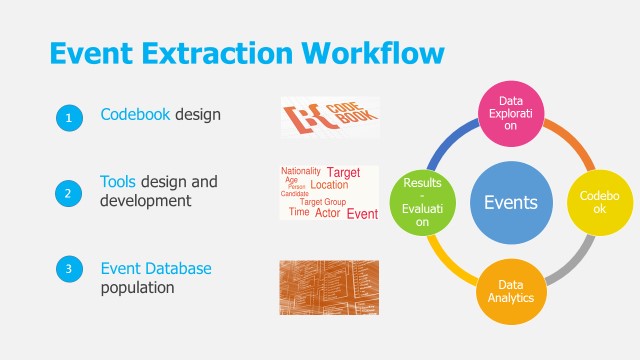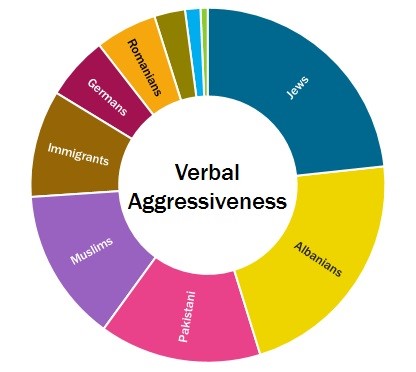
Tour de CLARIN highlights prominent User Involvement (UI) activities of a particular CLARIN national consortium. This time the focus is on Greece and Vassiliki Georgiadou, Associate Professor of Political Science at the Panteion University of Social and Political Sciences. The following interview took place via e-mail and was conducted by Maria Gavriilidou.
1. Could you tell us a little bit about yourself, your background and your current work?
I am Associate Professor of Political Science at the Department of Political Science and History of Panteion University of Social and Political Sciences. Our University is one of the oldest Greek universities, and the first school of Political Sciences in Greece. I studied Political Science in Athens (Panteion) and in Münster, Germany (Institute of Political Science) and I hold a PhD from the Faculty of Philosophy of the Westphalian Wilhelms University of Münster. I am a member of the Steering Committee of the Centre for Political Research of Panteion University, which operates as a laboratory of Political Sociology and Comparative Politics. Since April 2016, I am a member of the National Council against Racism and Intolerance in Greece, which has already started planning a national strategy in order to combat discrimination and racism.
My research interests focus on political behaviour, far right parties, populism, radicalism and political extremism. I was principal investigator of the XENO@GR research programme, which examines xenophobia in Greece during the economic crisis, based on a computational social sciences approach; currently, I am co-investigator of a research project that examines the different expressions of violence in Greece from 2008 onwards (London School of Economics (LSE)-Hellenic Observatory Grants).
2. How did you hear about CLARIN and how did you get involved?
I knew about this European research network, since CLARIN is one of the most relevant infrastructures for researchers of the humanities and the social sciences working with language related material. I am also involved in So.Da.Net network, which is another research infrastructure that brings together social sciences data archives across Europe, and I was aware of the facilities that research infrastructures provide to the scientific community in order to conduct top-level research in their respective fields. I became involved in clarin:el during our project XENO@GR and the collaboration with the research team of ILSP/ATHENA, which coordinates the clarin:el consortium and was also our research partner in the XENO@GR project.
3. Could you describe the XENO@GR project in more detail?
The basic aim of this research effort was to examine the phenomenon of xenophobia in Greece through a large-scale multi-source study based on the use of advanced computational social science approaches. There is a common perception that xenophobia is a deep-rooted social phenomenon that escalates under circumstances of severe economic crisis. In line with this perception, xenophobia should have increased in Greece after the outburst of the economic crisis in 2009. Drawing on a vast amount of data from a rich variety of sources and exploiting a wealth of research instruments, we tried to test the validity of the above-mentioned argument targeting and addressing the research goals:
- to study the historical evolution of the phenomenon of xenophobia in Greece from the 1990s onwards,
- to examine whether or not the recent economic crisis has raised the xenophobic sentiments and behaviours of Greeks against any kind of “others”, and
- to decompose the effect of the economic crisis on the behaviour of the Greek people against the “others”, in order to examine the expressions of continuity as well as the possibility of change, with reference to xenophobia as a social phenomenon deeply rooted in the perceptions and consciousness of Greeks.
To achieve the above goals, we created a large event database capturing events which are related to the phenomenon under study and happened in the timespan of the last twenty years. All entities (people, organisations and locations) involved in these events as well as the sentiments and emotions expressed have been captured and coded in a knowledge network facilitating the exploration and further analysis of the social interaction in the Greek society.

Figure 1: The workflow for creating the event database in the project
4. On the basis of your work within this project, could you exemplify how Social Sciences and Humanities researchers collaborate with experts from a research infrastructure offering language technologies (in your case, the Greek CLARIN consortium)?
In our first contact with language technologies we were impressed by the potentialities we had in our hands. We understood that every text, sound or video in the world is a new data source. We were confronted with different and rich data sources and we selected those that could help us answer our research questions. Our next step was to decide how to analyse them. Language technology experts explained all the possibilities and we decided to use event analysis for the newspaper data we had and sentiment analysis for the social media data. We collaborated in order to build a codebook for the events’ description and a similar first-step categorization of twitter data that resulted in different sentiment categories of verbal aggressiveness. This procedure was a step by step collaboration of both teams (social scientists and language technology experts) at both the conceptual and the analytical level. The findings were coded and then stored in a knowledge network so as to promote the examination and analysis of the social interaction in the Greek society.

Figure 2: The main targets of verbal aggressiveness in Greece in terms of national/ethnic background, based on the analysis of Greek newspapers during the XENO@GR project
5. How has CLARIN influenced your way of working? Would you like to single out any tools and resources provided by the Greek consortium that you used in your work?
CLARIN (and every other repository infrastructure) must be considered as an innovative tool of communication between researchers and a discussion platform for the academic community. With CLARIN, every researcher has the opportunity to use language resources and computational tools for analyzing empirical data, while being affiliated with the ethical and technical rules and standards of data management and data protection. In addition, data collection and analysis must comply with methodological standards that will facilitate their replication or reproduction and corroboration. Clarin:el offers a number of data analysis tools like sentiment analysis and event analysis. In particular, in the XENO@GR project we used Natural Language Processing ( ) tools (offered by clarin:el as web services) for tokenization, sentence splitting, part-of-speech tagging, and lemmatization, before embarking on the more semantic, domain-specific event and sentiment analysis of the XENO@GR data. A detailed description of the tools used can be found in the project's website. All of our processed data were uploaded at clarin:el.

Figure 3: the NLP tasks performed on the XENO@GR data
6. How easy was it for you to adapt to the changes that language technologies introduced in your research methodology? Do you think that using language technologies opens up new research opportunities for political scientists?
From my point of view as a social scientist, it is quite challenging to collaborate with colleagues from other disciplines. Through interdisciplinarity, I believe that academic research can become more robust and useful to the society. However, it is not an easy task to find a common communication code with a discipline that is mostly based on technology. At the beginning we had to adjust to the terminology that the two teams used, in order to choose the appropriate operational definitions for our study; but as soon as this became common ground, we obtained a new perspective for our research and became familiar with the potential that this interdisciplinary collaboration brings. We live in a world with multiple data sources that can be valuable not only for science but for the stakeholders, too. Language technologies give us the opportunity to explore large amounts of data in a minimum amount of time and thus make more concrete and grounded inferences. I believe that this is a huge step for social sciences in general and it expands research opportunities as well.
7. Did this experience influence your decision to join the clarin:el network and set up your own LRs repository?
The clarin:el network facilitates the access to language data sources that are extremely relevant in our research as social scientists. Having joined the network as a legal entity (Panteion University), first we can upload and share our data through the University data repository enabling researchers to work with our resources, and second we can have access to the resources of others. This provides synergies among researchers and improves data availability, accessibility and sustainability.
8. Could you share your experience with the recent clarin:el event for Social Sciences and Humanities researchers (27 June)? How are such events valuable to your research community?
The purpose of this event was to bring together clarin:el with members of Social Sciences research community in Greece, notably researchers from the Panteion University and the National Centre for Social Research that joined clarin:el in 2017 and 2018 respectively. For us, as the new members of the infrastructure, it was extremely important to be informed of what our participation in clarin:el can bring, how to get involved and take advantage of the opportunities offered by the infrastructure. The keynote talk (Maria Gavriilidou) and the presentations (Xaris Papageorgiou, Maria Pontiki, Stelios Piperidis) elaborated on the clarin:el infrastructure, the architecture, the contents, technical and legal issues regarding the use and the sharing of resources that are available in clarin:el. For us, as social scientists, it was particularly useful that the presentations were followed by an intensive hands-on session, where we were trained on the use of the clarin:el infrastructure.
9. How would you envisage future collaboration of your University with CLARIN?
I hope that more members of our research community at the Panteion University will get involved in clarin:el and our students, researchers and colleagues will take advantage of the opportunities offered by the infrastructure.
Click here to read more about Tour de CLARIN